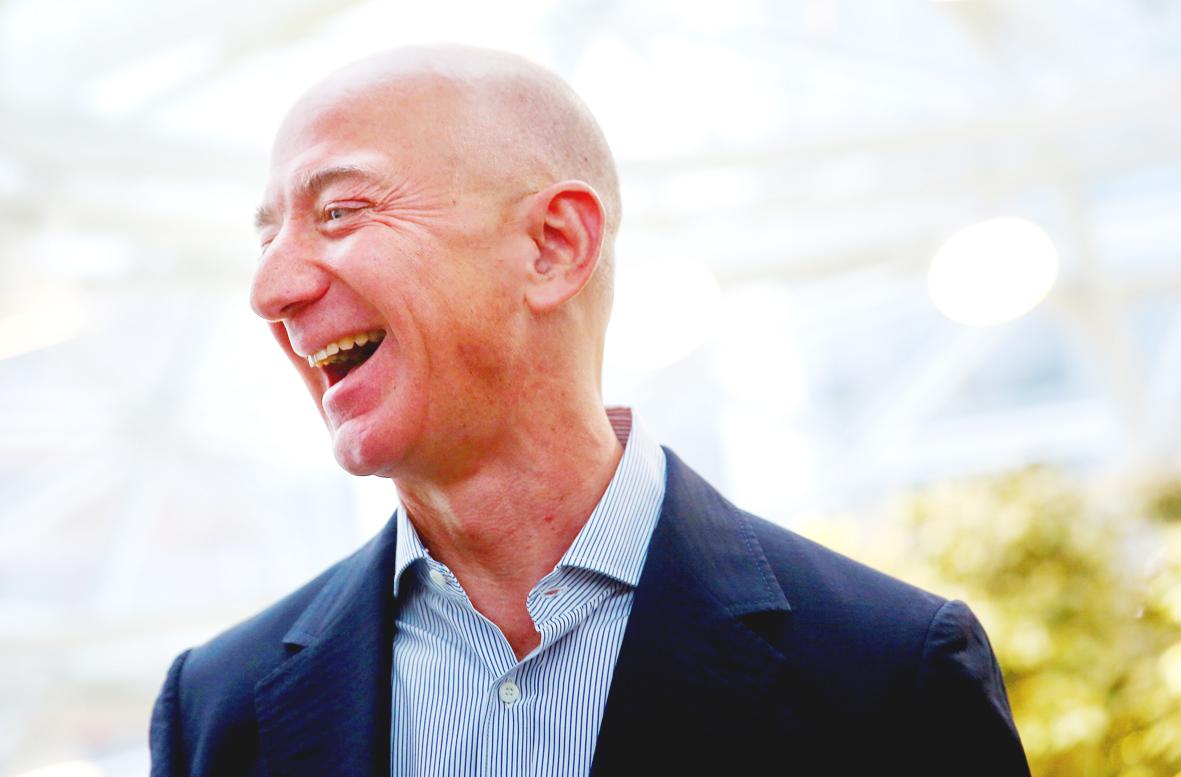The world’s billionaires “did extremely well” during the COVID-19 pandemic, growing their already huge fortunes to a record high of US$10.2 trillion.
A report by Swiss bank UBS Group AG found that billionaires increased their wealth by 27.5 percent at the height of the crisis from April to July, just as millions of people around the world lost their jobs or were struggling to get by on government schemes.
The report found that billionaires had mostly benefited from betting on the recovery of global stock markets when they were at their nadir during the global lockdowns in March and April.

Photo: Reuters
UBS said that billionaires’ wealth had hit “a new high, surpassing the previous peak of US$8.9 trillion reached at the end of 2017.”
The number of billionaires has also hit a new high of 2,189, up from 2,158 in 2017.
“Billionaires did extremely well during the COVID crisis, not only [did] they ride the storm to the downside, but also gained up on the upside [as stock markets rebounded],” said Josef Stadler, the head of UBS’ global family office department, which deals directly with the world’s richest people.
Stadler said that the super-rich were able to benefit from the crisis because they had “the stomach” to buy more company shares when equity markets around the world were crashing.
Global stock markets have since rebounded making up much of the losses. The shares in some technology companies — which are often owned by billionaires — have risen very sharply.
Billionaires typically have “significant risk appetite” and were confident to gamble some of their considerable fortunes, Stadler said.
Luke Hilyard, executive director of the High Pay Centre, a think tank that focuses on excessive pay, said that the “extreme wealth concentration is an ugly phenomenon from a moral perspective, but it’s also economically and socially destructive.”
“Billionaire wealth equates to a fortune almost impossible to spend over multiple lifetimes of absolute luxury,” Hilyard said. “Anyone accumulating riches on this scale could easily afford to raise the pay of the employees who generate their wealth, or contribute a great deal more in taxes to support vital public services, while remaining very well rewarded for whatever successes they have achieved.”
“The findings from the UBS report showing that the super-rich are getting even richer are a sign that capitalism isn’t working as it should,” Hilyard said.
Stadler said the fact that billionaire wealth had increased so much at a time when hundreds of millions of people around the world are struggling could lead to public and political anger.
“Is there a risk they may be singled out by society? Yes,” he said. “Are they aware of it? Yes.”
“Wealth concentration is as high as in 1905, this is something billionaires are concerned about,” he said. “The problem is the power of interest on interest — that makes big money bigger and, the question is to what extent is that sustainable and at what point will society intervene and strike back?”
The UBS report did not rank the fortunes of the world’s wealth, but the richest person on the planet is Jeff Bezos, the founder and chief executive of Amazon, with US$189 billion.
Bezos’ wealth has increased by US$74 billion so far this year, the Bloomberg Billionaires Index showed, due to the surge in Amazon’s share price as more people turned to the company.

To many, Tatu City on the outskirts of Nairobi looks like a success. The first city entirely built by a private company to be operational in east Africa, with about 25,000 people living and working there, it accounts for about two-thirds of all foreign investment in Kenya. Its low-tax status has attracted more than 100 businesses including Heineken, coffee brand Dormans, and the biggest call-center and cold-chain transport firms in the region. However, to some local politicians, Tatu City has looked more like a target for extortion. A parade of governors have demanded land worth millions of dollars in exchange

Hong Kong authorities ramped up sales of the local dollar as the greenback’s slide threatened the foreign-exchange peg. The Hong Kong Monetary Authority (HKMA) sold a record HK$60.5 billion (US$7.8 billion) of the city’s currency, according to an alert sent on its Bloomberg page yesterday in Asia, after it tested the upper end of its trading band. That added to the HK$56.1 billion of sales versus the greenback since Friday. The rapid intervention signals efforts from the city’s authorities to limit the local currency’s moves within its HK$7.75 to HK$7.85 per US dollar trading band. Heavy sales of the local dollar by

Taiwan Semiconductor Manufacturing Co’s (TSMC, 台積電) revenue jumped 48 percent last month, underscoring how electronics firms scrambled to acquire essential components before global tariffs took effect. The main chipmaker for Apple Inc and Nvidia Corp reported monthly sales of NT$349.6 billion (US$11.6 billion). That compares with the average analysts’ estimate for a 38 percent rise in second-quarter revenue. US President Donald Trump’s trade war is prompting economists to retool GDP forecasts worldwide, casting doubt over the outlook for everything from iPhone demand to computing and datacenter construction. However, TSMC — a barometer for global tech spending given its central role in the

An Indonesian animated movie is smashing regional box office records and could be set for wider success as it prepares to open beyond the Southeast Asian archipelago’s silver screens. Jumbo — a film based on the adventures of main character, Don, a large orphaned Indonesian boy facing bullying at school — last month became the highest-grossing Southeast Asian animated film, raking in more than US$8 million. Released at the end of March to coincide with the Eid holidays after the Islamic fasting month of Ramadan, the movie has hit 8 million ticket sales, the third-highest in Indonesian cinema history, Film